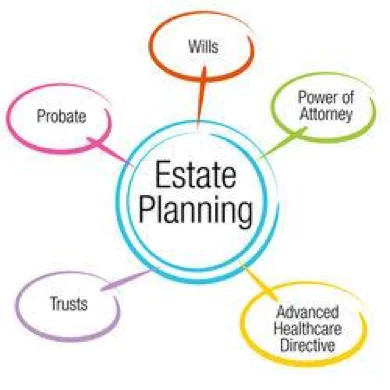
Some people think estate planning is only for wealthy individuals who own several million-dollar properties all over the world. Nothing could be farther from the truth. The most basic definition of estate planning is straightforward and simple. It is the process of deciding what happens to your assets and affairs when you die or become incapacitated. By this definition, estate planning is for practically everyone.
A last will and testament is often the first thing that people associate with estate planning. It’s true that leaving a will behind can help ensure that your dying wishes are carried out. But there’s more to estate planning than a last will and testament. Your professional and personal circumstances may require setting up a trust to protect and preserve your assets. The most common type of trust used in estate planning is the revocable living trust. However, your individual circumstances may dictate using an irrevocable trust instead. A good estate planner can advise you on this matter.
Sound estate planning should not only be about what you will leave behind. It should also include provisions for your care in case you are no longer able to make these decisions yourself. A trusted family member or friend can act as your representative in matters of healthcare. You should also designate someone to make financial decisions for you under the same dire circumstances. Finally, have your wishes regarding the final arrangements for your remains clearly written down. Estate planning should leave little as possible to chance.

Write a Will
Roughly two-thirds of Americans die intestate, that is, without leaving a will. This may be largely due to the fact that most people, not just Americans, are uncomfortable talking about death. Writing a will means facing one’s mortality, hence people tend to avoid it until it’s too late. But if you die without a will, the state gets to decide how your estate will be distributed. You may not necessarily agree with how the state will go about this. Of course, by the time the state takes over, you can no longer do anything about it. Having a will prevents this from happening. It helps to ensure that your plan for the disposition of your assets – not anyone else’s – is carried out.
Leaving a will is basic estate planning 101. It’s a good place to begin, but don’t stop there. A will can be subject to probate, a process whereby a deceased person’s last testament is “authenticated” by the court. This means it accepts the document as indeed being the deceased person’s instructions for the final disposition of his or her assets. Depending on the size of your estate, a probate can be a costly and time-consuming ordeal for your family. This at a time when they are grieving and perhaps most in need of the assets left behind for them. A probate also places your will in the public domain. This means anyone can access the terms of your will and use this information to their advantage.

Revocable Living Trust in Estate Planning
Seasoned estate planning professionals often resort to using trusts as a way to avoid probate. The most commonly used trust for estate planning purposes is the revocable living trust, or an inter vivos trust. Transferring ownership of your assets to a trust automatically place these assets outside the probate process. In order to retain control of the assets during your lifetime, you designate yourself as the trustee. However, upon your passing, these assets skip probate and go directly to your designated beneficiary or beneficiaries.
Your professional and personal situation can undergo significant changes through the years. For this reason, you should remember to review the terms of your trust regularly. Certainly do so with the birth or adoption of a child or the beginning or end of a marriage. You need to make sure the trust provisions reflect your current life situation and future financial goals.
There is a caveat in the use of trusts as an estate planning tool. Some individuals work in a field where the possibility of being sued is high. This typically includes professionals in the medical and legal arenas. If this is your situation, you may need to consider a different type of estate planning trust, the irrevocable trust.

Irrevocable Living Trust in Estate Planning
The irrevocable trust has strong asset protection features. Once an irrevocable trust has been established and funded, the grantor no longer has control over the assets. That task now falls to a trustee, a third party who administers the trust for the beneficiary. Why would you voluntarily give up control over assets you worked so hard for in the first place? The answer is simple: this strategy can protect them from predatory claims and preserve them for your heirs.
A revocable trust does not work the same way an irrevocable trust does. If someone wins a judgement against you, the court can order you to allocate trust assets to satisfy the judgement. This is possible since you are the trustee and the terms of the trust can be altered. However, the terms of an irrevocable trust cannot be altered once the trust has been established. Moreover, you are not the trustee. This means you have no power over the assets and therefore cannot control who receives the interest from them. A claimant will have to sue the trust to access your assets. Even then, the terms of the trust may prevent the assets from being used to satisfy a successful claim.
It’s worthwhile to keep in mind that the irrevocability of an irrevocable trust is not always absolute. A court can breach this protection if there is a strong case linking trust assets to terrorism or drug trafficking. Short of this extreme scenario, however, assets protected by an irrevocable trust are just that – protected. Plus this is one of the only vehicles available where you can use your assets and still have full Medicaid eligibility. That is, when you have your assets in one, you can receive long-term care and nursing home assistance from the government.

Advanced Health Care Directives
Estate planning should also include directions for your future care in the event you become incapacitated. Give someone you trust a durable power of attorney for health care. He or she should be clear on what you want to happen with regards to your care if you can no longer make this decision yourself. This person will instruct healthcare providers on issues such as radical medical intervention or life-prolonging treatments. Make sure he or she is someone you can trust to relay your wishes to your doctors or nursing facility. Most states allows this type of intervention only when a patient is in a permanent coma or close to death because of a terminal illness. Along a similar vein, give someone power of attorney over your finances. This person will make financial decisions for you when you can no longer do so on your own.

Additional Estate Planning Basics
Set up a payable-on-death account with banks or credit unions where you have a checking or savings account. This allows you to name a beneficiary who can take the account funds when you die. For bonds, stocks and similar instruments, you need to establish a transfer-on-death designation. This basically works the same way as the payable-on-death account. Your designated beneficiary is entitled to the financial instruments at the time of your death. Both arrangements have the added advantage of avoiding probate for your heirs. This means they can access the funds in the accounts immediately.
Be sure to have a document that clearly states your preference for either cremation or a burial. You may have already indicated your preference to your spouse or adult children. But grief can cloud memories as well as judgement, so it’s still a good idea to have this written down. Bequests, such as sentimental items or small amounts for long-time associates, can be contained in a separate document. You can change this at any time without paying to update your will. Remember to date the document every time you amend it so your heirs will know they have the latest version.

Conclusion
You may think you’re not rich enough to be concerned about estate planning but you would be wrong. Estate planning isn’t about wealth distribution. It’s about making sure your wishes and plans for your assets and heirs are carried out after your death. Towards this end, writing a will is a good first step. However, if you wish to avoid probate, you may want to consider using trusts as part of your estate plan. A knowledgeable estate planner will know whether to recommend a revocable or irrevocable trust to house your assets. Estate planning should also include provisions for your care in the event you can no longer make these decisions yourself. Give power of attorney to someone who you know with honor your wishes. This holds true for both healthcare and financial matters.
A final word – there is no such thing as a basic estate planning template that works for everyone. As with asset protection, an estate plan is crafted for each individual. Similar instruments and devices may be used, but each estate plan is customized according to your unique circumstances.
It’s never easy to grapple with one’s departure from this mortal coil. But knowing that you are leaving your loved ones well-provided for should ease any discomfort the thought of dying brings.
——————–
Note: The above is for informational purposes only on this page is not to be considered tax, legal or other professional advice. If such advice is needed, seek the services of a licensed attorney or accountant.



